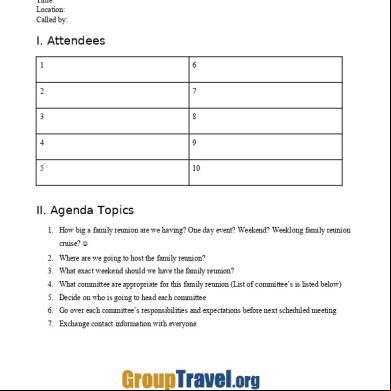Lit ! Family Reunion 106f6t
This document was ed by and they confirmed that they have the permission to share it. If you are author or own the copyright of this book, please report to us by using this report form. Report 3b7i
Overview 3e4r5l
& View Lit ! Family Reunion as PDF for free.
More details w3441
- Words: 731
- Pages: 15
Family Reunion By Carlos A. Angeles
Author • Born on May 25, 1921 in Tacloban city, Leyte • Graduated from Rizal High 1938 and went to study at various universities, first in pre-medicine and next prelaw. • Press assistant under the Garcia istration and public relations manager of PanAm airlines • He also served in the Board of directors of international PEN • His Angeles’ collection of poems received first prize in the Carlos Palanca Memorial Awards for Literature • Angeles has been living in the USA since 1978
Family reunion It must have been a letter sent, it must. Have been some mute desire made vocable At last my word or whisper, or as hummed By someone who was never there at all. Must have been ; it was not a Holyday Nor death; there was no testament to hear. It was as if-no, none could half suppose What purpose we came with, why we were there.
Papa called us by our names as we stepped To kiss his hand, and Mama watched, caressing Us with focused love, and spoke the welcome, “Welcome!” And us, we wept at such addressing
Papa was human, He forgot how long Our absence was, but led us in; and in. The centered room spoke syllables to us Like love, like love. Mama forgave our sins. Simply by closing the door behind her, And as simply, shut out the outside world. And here, at last, we prodigals closed in Like remnants which were being slowly furled.
Subject matter • The reunion and reconciliation of the Parents and their Children
Theme • Forgiveness
Emotion Mood • Pleased • Feeling of Love
Tone • Serious • Formal
Poetic Device Repetition 1st stanza • It must have been a letter sent, it must. • Have been some mute desire made vocable
1st line 2nd line
2nd stanza • Must have been ; it was not a Holyday
1st line
4th stanza
• Our absence was, but led us in; and in. • Like love, like love. Mama forgave our sins.
2nd line 4th line
Poetic Device Rhyme 1st stanza • It must have been a letter sent, it must. Have been some mute desire made vocable At last my word or whisper, or as hummed By someone who was never there at all. 3rd stanza • Papa called us by our names as we stepped To kiss his hand, and Mama watched, caressing Us with focused love, and spoke the welcome, “Welcome!” And us, we wept at such addressing
Poetic Device Rhyme 5th stanza • Simply by closing the door behind her, And as simply, shut out the outside world. And here, at last, we prodigals closed in Like remnants which were being slowly furled.
Poetic Device Figurative speech Personification • Papa was human, He forgot how long Our absence was, but led us in; and in. The centered room spoke syllables to us Like love, like love. Mama forgave our sins. Simile
• Simply by closing the door behind her, And as simply, shut out the outside world. And here, at last, we prodigals closed in Like remnants which were being slowly furled.
Poetic Device Structure • Quatrain ( 4 lines) Form • Narrative Poem Rhythm and Meter • Open verse • Number of feet • Five feet = pentameter
1
I
2
I
3 I
4
I
5
• It must / have been / a let / ter sent, / it must.
Your response • The poem is somewhat similar to the bible story The Prodigal Son, in the sense that the children in both the poem and the story have done something wrong, but regardless of what happened , their parents overlooked their recklessness and forgave them in the end.
Graphic Elements Sentence Structure • The use of compound sentences in the poem gives off a serious and formal tone. Capital Letter • The traditional rule is used in the poem in which the letter of each line is capitalized regardless of wether or not it stars a new sentence.
Graphic Elements Punctuation • The punctuations such as period (.) and comma (,) are used naturally in each sentence disregarding wether or not it stars a new stanza to compensate for the number of syllables in a line. • The use of exclamation point (!) was use in the word “Welcome!” to express feeling
Author • Born on May 25, 1921 in Tacloban city, Leyte • Graduated from Rizal High 1938 and went to study at various universities, first in pre-medicine and next prelaw. • Press assistant under the Garcia istration and public relations manager of PanAm airlines • He also served in the Board of directors of international PEN • His Angeles’ collection of poems received first prize in the Carlos Palanca Memorial Awards for Literature • Angeles has been living in the USA since 1978
Family reunion It must have been a letter sent, it must. Have been some mute desire made vocable At last my word or whisper, or as hummed By someone who was never there at all. Must have been ; it was not a Holyday Nor death; there was no testament to hear. It was as if-no, none could half suppose What purpose we came with, why we were there.
Papa called us by our names as we stepped To kiss his hand, and Mama watched, caressing Us with focused love, and spoke the welcome, “Welcome!” And us, we wept at such addressing
Papa was human, He forgot how long Our absence was, but led us in; and in. The centered room spoke syllables to us Like love, like love. Mama forgave our sins. Simply by closing the door behind her, And as simply, shut out the outside world. And here, at last, we prodigals closed in Like remnants which were being slowly furled.
Subject matter • The reunion and reconciliation of the Parents and their Children
Theme • Forgiveness
Emotion Mood • Pleased • Feeling of Love
Tone • Serious • Formal
Poetic Device Repetition 1st stanza • It must have been a letter sent, it must. • Have been some mute desire made vocable
1st line 2nd line
2nd stanza • Must have been ; it was not a Holyday
1st line
4th stanza
• Our absence was, but led us in; and in. • Like love, like love. Mama forgave our sins.
2nd line 4th line
Poetic Device Rhyme 1st stanza • It must have been a letter sent, it must. Have been some mute desire made vocable At last my word or whisper, or as hummed By someone who was never there at all. 3rd stanza • Papa called us by our names as we stepped To kiss his hand, and Mama watched, caressing Us with focused love, and spoke the welcome, “Welcome!” And us, we wept at such addressing
Poetic Device Rhyme 5th stanza • Simply by closing the door behind her, And as simply, shut out the outside world. And here, at last, we prodigals closed in Like remnants which were being slowly furled.
Poetic Device Figurative speech Personification • Papa was human, He forgot how long Our absence was, but led us in; and in. The centered room spoke syllables to us Like love, like love. Mama forgave our sins. Simile
• Simply by closing the door behind her, And as simply, shut out the outside world. And here, at last, we prodigals closed in Like remnants which were being slowly furled.
Poetic Device Structure • Quatrain ( 4 lines) Form • Narrative Poem Rhythm and Meter • Open verse • Number of feet • Five feet = pentameter
1
I
2
I
3 I
4
I
5
• It must / have been / a let / ter sent, / it must.
Your response • The poem is somewhat similar to the bible story The Prodigal Son, in the sense that the children in both the poem and the story have done something wrong, but regardless of what happened , their parents overlooked their recklessness and forgave them in the end.
Graphic Elements Sentence Structure • The use of compound sentences in the poem gives off a serious and formal tone. Capital Letter • The traditional rule is used in the poem in which the letter of each line is capitalized regardless of wether or not it stars a new sentence.
Graphic Elements Punctuation • The punctuations such as period (.) and comma (,) are used naturally in each sentence disregarding wether or not it stars a new stanza to compensate for the number of syllables in a line. • The use of exclamation point (!) was use in the word “Welcome!” to express feeling










